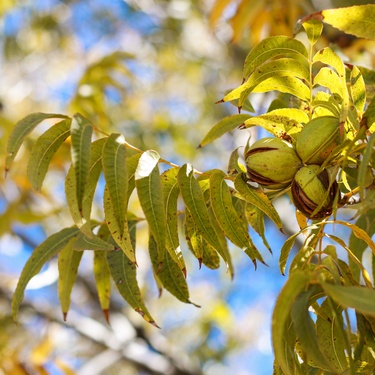
Planting a tree is one of the most rewarding things you can do. It adds beauty to your landscape, creates a habitat for wildlife, and improves air quality. When you plant a nut tree, you get all these benefits plus a delicious, sustainable food source right in your own backyard.
This guide will walk you through some of the best nut trees to consider for your garden. We'll explore their unique benefits and what makes them a fantastic choice for anyone looking to add a productive and beautiful element to their outdoor space.
Why Plant Nut Trees?
Nut trees are a long-term investment that pays off in many ways.
- Sustainable Food Source: Enjoy fresh, organic nuts without the packaging and food miles of store-bought options.
- Shade and Beauty: Mature nut trees provide wonderful shade in the summer and add significant visual appeal to your property.
- Wildlife Haven: Birds and squirrels will thank you for the food and shelter your new tree provides.
Top Nut Trees for Your Garden
When choosing a nut tree, consider your climate, soil type, and the amount of space you have. Here are a few excellent options to get you started.
1. Almond (Prunus dulcis)
Almond trees grace your garden with beautiful, fragrant blossoms in the spring before producing their popular nuts. They thrive in climates with hot, dry summers, making them perfect for many parts of California and the Southwest. Freshly harvested almonds have a rich, sweet flavor you just can't find in stores.
Plant Tip: For most varieties, you'll need to plant at least two trees to ensure cross-pollination.
2. Walnut (Juglans)
Walnut trees grow into large, majestic shade trees that produce rich, flavorful nuts perfect for baking or snacking. The English Walnut (Juglans regia) is a popular choice for its delicious nuts and manageable size compared to the native Black Walnut. These trees need deep, well-drained soil and plenty of sun to flourish. A single tree can produce a substantial harvest, making it a great provider for your household.
3. Pecan (Carya illinoinensis)
A classic American tree, the pecan is famous for its sweet, buttery nuts. Pecan trees can grow very large, so they are best suited for spacious yards. They love long, hot summers, but they also require ample water to produce a good crop. One common mistake when growing pecan trees has to do with watering, so make sure to pay close attention to the trees hydration needs.
If you have the space, a pecan tree offers decades of shade and bountiful harvests for pies, pralines, and more.
Plant Tip: Some varieties are self-pollinating, but planting two different types often yields a better crop.
4. Hazelnut (Corylus)
If you have a smaller garden, consider the hazelnut. It grows as a multi-stemmed shrub or a small tree, fitting into spaces where larger nut trees won't. Hazelnuts, also known as filberts, produce sweet nuts that are a key ingredient in many desserts and spreads. They are relatively easy to grow and adapt to a wide range of climates.
Start Your Sustainable Harvest
Planting a nut tree connects you directly to your food source and adds a beautiful, productive element to your landscape. By choosing the right tree for your space, you can enjoy years of shade, beauty, and delicious, home-grown nuts. It’s a simple step toward a more sustainable and flavorful life.
Bio: Casey is a passionate copyeditor highly motivated to provide compelling SEO content in the digital marketing space. Her expertise includes a vast range of industries from highly technical, consumer, and lifestyle-based, with an emphasis on attention to detail and readability.

























